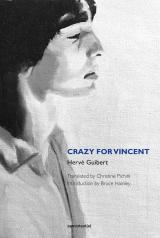
Crazy for Vincent
Hervé Guibert
Translated by Christine Pichini
Semitext(e)
Paperback, 96 pages
At what point does infatuation become obsession? When does love become a habit, and what does it mean to desire what destroys you? In Crazy for Vincent, Hervé Guibert, the French writer, and photographer, addresses these questions in relation to the author’s own tempestuous relationship with a young man named Vincent. Originally published in French in 1989, Crazy for Vincent has been translated into English for the first time by Christine Pichini.
Guibert published several works across many genres during his short life, dealing heavily with themes of death, homosexuality, and the body. Crazy for Vincent is no exception. Beginning with Vincent’s death following his fall from a third story window, Guibert traces their relationship back through the years, piecing together excerpts from his journal to form a portrait of a man. What emerges from the fragments is the haunting and visceral evocation of a body, ravaged by the violence of youth and cursed with a homely face.
Vincent is a wild youth, drug-addled and self-destructive. Yet despite this, or perhaps because of it, Guibert develops a deep sexual infatuation with the young man that sustains him through years of the drug-fueled encounters and the disappointed expectations that come from loving something damaged.
Guibert’s relationship to Vincent is one deeply entrenched in the taboo. His obsession with the teenaged Vincent is itself questionable by conventional standards of decency. Guibert goes beyond this, though, and deeply engages with the transgressive to provide an accurate and ugly portrayal of obsession. He writes vivid depictions of violence against the object of his desire, stabbing Vincent and smashing his skull in order to see his brain matter, paired with passages voicing his desire to photograph Vincent’s genitals surrounded by flowers. His obsession with Vincent is raw and unsettling, but beautiful in its honesty. His desire is unrestrained and unburdened by rationality or any sense of self-preservation. Guibert fantasizes about piercing his vein with a syringe as Vincent watches, sexualizing the drugs that fueled their encounters and enabled their mutual self-destruction. He writes of the visible sores and scabs on Vincent’s skin and embraces them openly. The text is one of Guibert’s few books to deal explicitly with AIDS, and it does so with an almost lighthearted, airy approach. In a scene where Vincent tells Guibert he has AIDS, all he offers in response is that it’s a good way to get exempt from service—a response made all the more chilling by the knowledge of Guibert’s own death from AIDS-related complications just a few years later.
The relationship between Guibert and Vincent is a mirror. The soaring highs and crushing lows of Vincent’s company, or his denial of it, mirror Vincent’s own relationship to drugs. Vincent’s denial of the relationship, both in public and in private, and his struggle with gay identity serve to complicate, and pull Guibert further into his obsession with understanding, or as he puts it, characterizing Vincent. This attempt, and ultimate failure, to characterize Vincent work well with the form of the text. He works backward, beginning at the end. We’re given an almost episodic look into the history of this relationship, a search for meaning through their numerous encounters. Guibert lays bare his desire to gravitate towards the dangerous, and his masochistic impulse to love something that would have destroyed him.
Matthew Turkot is an MFA Fiction Candidate in the Creative Writing Department at Columbia College Chicago.


